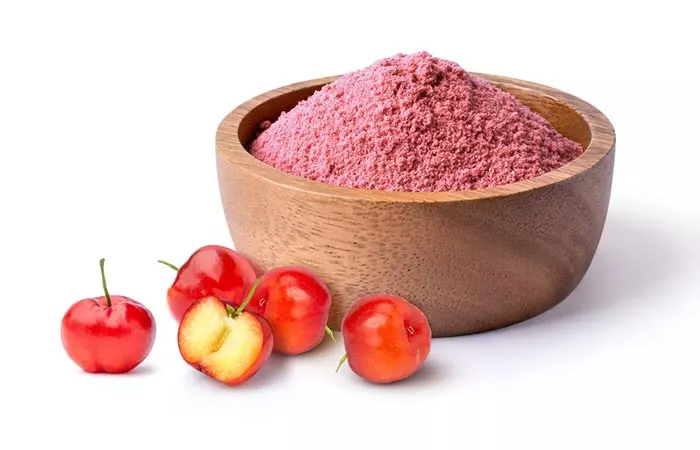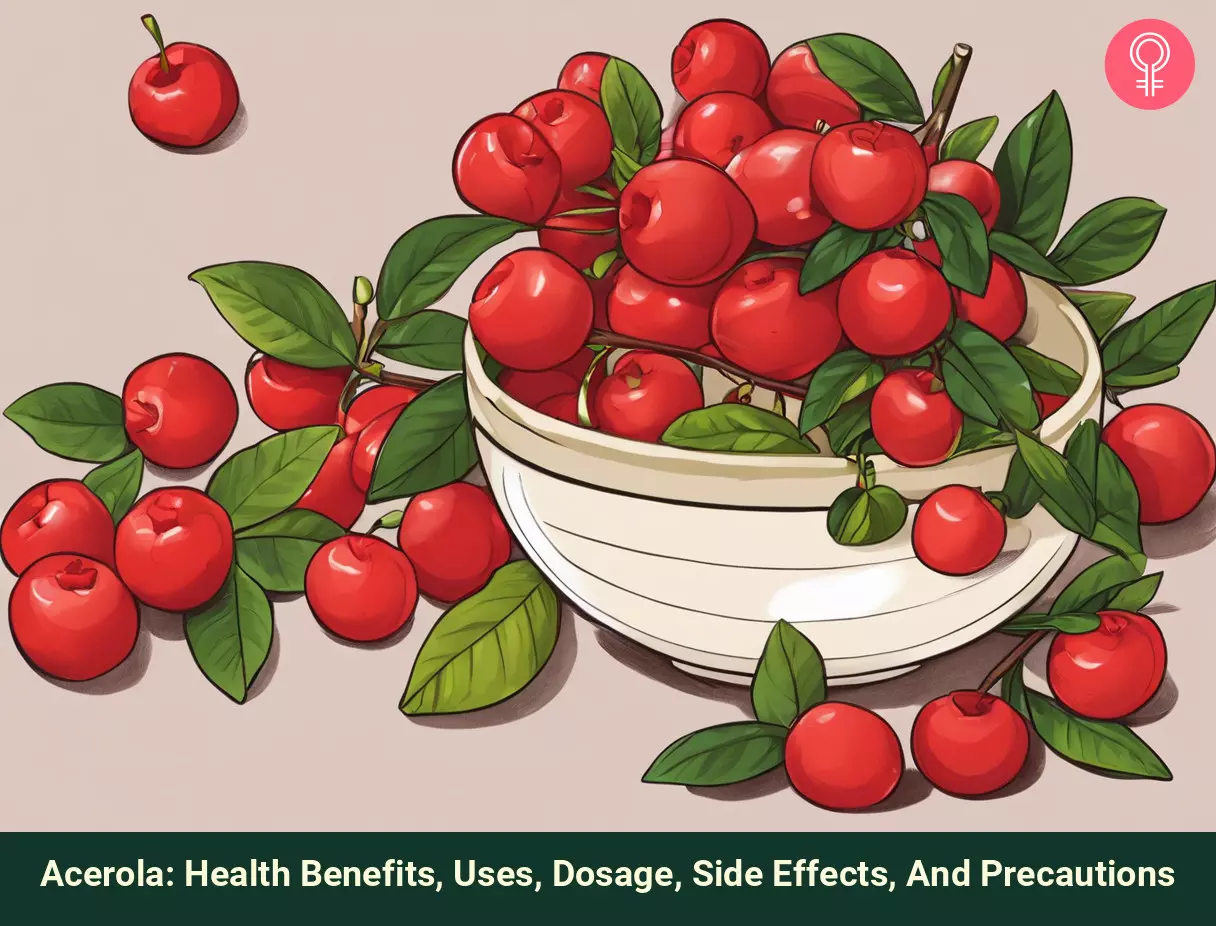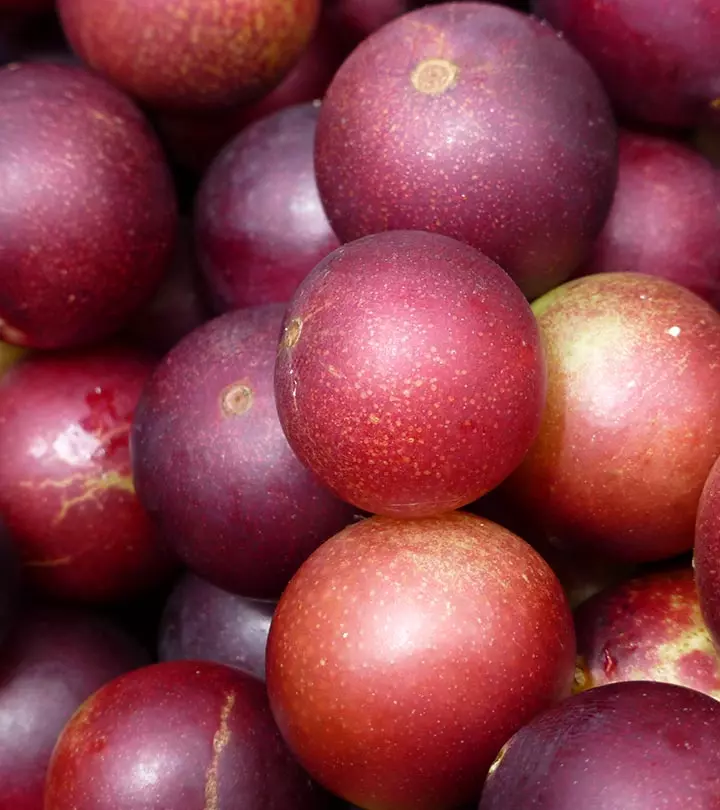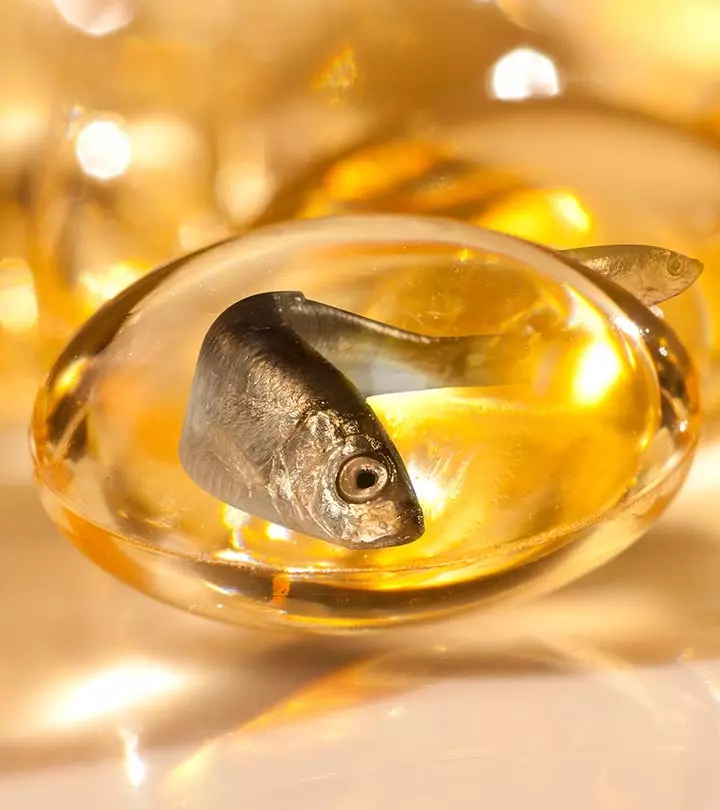Acerola: Health Benefits, Uses, Dosage, Side Effects, And Precautions
Indulge in this exotic fruit every day to make the most of its medicinal properties.

Image: ShutterStock
The benefits of acerola cherries are gaining the attention of many health enthusiasts and fitness freaks
. These cherries were an integral part of traditional medicine. They were used to treat collagen disorders, immune disorders, and dental infections. These benefits can be attributed to its vital nutrients, including vitamin C. Additionally, they are used to treat liver ailments, diarrhea, cough, common cold, scurvy, and blood clots. These are also popularized as nutraceutical supplements. Many believe that acerola may also help manage hangovers. Read on to learn more about acerola cherries, the benefits they offer, and how you can include them in your diet.
 Know Your Ingredient: Acerola
Know Your Ingredient: AcerolaWhat Is It?
A tropical fruit belonging to the Malpighiaceae family, native to the West Indies.
What Are Its Benefits?
It can improve your immunity, skin elasticity, and brain health.
Who Can Consume It?
It is safe for consumption by all in small quantities due to its high vitamin C content.
How Often?
It is advised that an adult consume only three acerola fruits per day, keeping in mind the recommended vitamin C intake.
Caution
Excess consumption can cause diarrhea, vomiting, nausea, heartburn, insomnia, and abdominal cramps or pain.
In This Article
What Is Acerola Cherry?

Acerola cherry (Malpighia emarginata) is more popularly referred to as West Indies cherry or Barbados cherry. It is native to the Caribbean, South America, and Mexico regions. These cherries are popular as juices, pulps, jams, and fruit concentrates. They appear blood-red due to the high content of anthocyanins (potent antioxidants). They taste sweet or sour, depending on the vitamin C concentration.
An avid blogger and gardener, recalls her personal experience of encountering some acerola cherries for the first time. She notes that in terms of size, the cherry is similar to a mini apple, and its color changes from green to red to dark maroon when fully mature. In terms of taste, she adds, “My sisters and myself tried this fruit, and find that it is quite nice with a sour taste but definitely not as sour as my belimbing (i)!”
Let us check the important benefits of acerola cherries in the next section.
 Trivia
TriviaKey Takeaways
- Acerola cherry appears blood-red due to its high anthocyanin content (potent antioxidants).
- The anti-fatigue activity of acerola cherries may help boost brain health.
- Their high vitamin C content may decrease uric acid levels and thus reduce gout flares.
4 Benefits Of Acerola

1. May Boost Immunity
Acerola cherries have been used in folk medicine to ward off cold, cough, scurvy, and respiratory ailments. Studies suggest that acerola cherries are a great source of ascorbic acid and total vitamin C. As per research, vitamin C is essential for the immune system as it helps fight infections. It is a potent antioxidant that regulates multiple metabolic pathways (1), ( 2).
Research has shown that supplementing your diet with vitamin C may help treat and prevent respiratory and systemic infections (2).
2. May Help Improve Skin Health
Studies state that polyphenol extracts from acerola cherries have skin-lightening effects
(3).
Another study published in the journal Nutrients states that vitamin C may help reduce inflammation and slow down the signs of aging. It helps fade fine lines and wrinkles by stimulating collagen production. Collagen is integral to maintain skin structure and function. Vitamin C also helps accelerate wound healing and reduces hyperpigmentation (4).
Acerola cherries are also a good source of vitamin A. Research supports the role of vitamin A in slowing down aging, treating acne, and helping in cancer prevention (5). Therefore, it is good food for attaining healthy and glowing skin. However, if you are looking for more fruits for glowing skin, the list is long. Choose what best suits your taste and preference.
3. May Improve Brain Health
Animal studies state that acerola cherries help boost brain health due to their anti-fatigue activity (6), (7). The anti-inflammatory properties of the cherries also help. Research shows that inflammation and stress may hurt cognitive function (8). However, more human studies are needed to understand how these cherries can help combat neurodegenerative diseases like Alzheimer’s and Parkinson’s.
4. May Improve Eye Health
The high vitamin C content in acerola cherry may benefit the eyes. It has been found that vitamin C can prevent UV-induced retinal damage (9). Vitamin C is also associated with reduced risk of cataracts, a condition where the eye lens gets clouded, leading to impaired vision (10). It may also potentially protect against age-related macular degeneration, a condition that causes vision loss in the elderly (11). These benefits of vitamin C potentially make acerola cherry a good food item for improving overall eye health.
There is limited data supporting the anti-depressant and anti-fungal properties of acerola cherries. It is unclear if they can also boost athletic endurance and treat any gastrointestinal issues.
Additionally, it can act as a natural remedy when it comes to aiding digestion, helping with weight loss and boosting heart health (12). These are the few important benefits of acerola cherries. As discussed, these cherries have an impressive nutritional profile. Let us explore the same in the next section.
Nutrition Profile Of Acerola Cherries

A single serving size of acerola cherries (100 gm) has the following nutritional profile (13):
- Calories: 32
- Vitamin C: 1677mg
- Vitamin A:767IU
- Fiber: 1.1 g
- Iron: 0.2mg
- Calcium :12mg
- Magnesium: 18mg
- Phosphorus: 11mg
 Trivia
TriviaWays To Make Use Of Acerola Cherries In Everyday Life

- You may use them as tinctures, as used in folk medicine.
- You may also pick organic skin care formulations with acerola cherry extracts. These products can have anti-aging benefits.
- You may also take acerola shots, acerola cherry powder, or freshly squeezed juice.
You can also try the following recipes with acerola cherries.
- Acerola cherry salsa
This simple salsa recipe is bound to be a hit in your Sunday brunches or cocktail parties.
You Will Need
- 300g of acerola cherries
- Small pinch of allspice
- Ground black pepper
- 2 tablespoons of coriander
- 4 cloves of garlic
- 1 hot green chili
- Juice of 1 lime
- 60ml of rapeseed oil
- Pinch of salt
Process
- Finely chop the chili, coriander, and garlic.
- Remove the stalks and seeds and crush the cherries. Keep the juice to one side and finely chop the cherries.
- Mix all ingredients and season to taste.
- Acerola Cherries In Syrup
This is a classic and useful condiment. The cherries can also be used to top desserts.
You Will Need
- 350 g of acerola cherries (fully ripe)
- 240 g of sugar
Process
- Set a stainless-steel pan on low heat.
- Tip in the sugar and the cherries.
- Stir softly and continuously for 5 minutes. The sugar would have melted.
- Turn up the heat and stir continuously. Turn down the heat for a few moments if the syrup becomes too frothy and starts to rise. Turn the heat up again as soon as the froth subsides.
- Turn the heat off after cooking for 5 minutes on high heat. When cool, transfer to a clean, sun-dried, airtight glass jar.
- Spinach Mango Smoothie With Acerola And Starfruit
A healthy way to kickstart your day is adding acerola cherries to your morning smoothies. Its antioxidants will boost your metabolism and improve skin health.
You Will Need
- A handful of spinach
- 150 g of frozen mangos
- 50 g of frozen pineapples
- 100 g of frozen acerola cherries
- 1 ripe banana
- 1 starfruit
- 500 ml of vanilla oat milk
Process
- Add all ingredients and blend them into a thick and creamy consistency.
- You can chill it for 15 minutes or have it as it is.
Dosage And Preparation
There is no clinical research to determine a specific safe dose of acerola. However, it is generally safe to follow the recommended guidelines for vitamin C supplementation when using acerola at home. These include the following (14):
- Children (1-3 years): 15 mg
- Children (4-8 years): 25 mg
- Children (9-13): 45 mg
- Teens (Boys): 75 mg
- Teens (Girls): 65 mg
- Adults (Men): 90 mg
- Adults (Women): 75 mg
- Pregnant women: 85 mg
- Breastfeeding women: 120 mg
Vitamin C is a water-soluble nutrient and rarely causes toxicity. However, check with your doctor before consuming high amounts of these cherries.
The dose of acerola cherries depends on your age and body weight. While there is limited information in this regard, it is always better to check with an expert. Be sure to follow the usage directions as stated on product labels.
Side Effects And Precautions

Anecdotal evidence suggests that excess intake of acerola cherries may cause:
- Nausea
- Stomach cramps
- Sleepiness
- Insomnia
- Diarrhea
Add this fruit to your diet in small quantities to avoid these side effects. If you notice any of the above symptoms, contact your doctor. If not, you may gradually increase your intake. However, ensure that you consume it only in moderation.
The following individuals must practice extra caution before consuming these cherries.
1. Pregnant And Breastfeeding Women
There are no specific studies suggesting the safety of acerola during pregnancy and breastfeeding. Stay safe and avoid use.
2. People With Kidney Stones
Excess vitamin C intake may increase the risk of kidney stones. Hence, individuals with kidney stones must consult their doctor before consuming acerola cherries.
3. People With Kidney Stones
Excess vitamin C intake may increase the risk of kidney stones
. Individuals with kidney stones must consult their doctor before consuming acerola cherries.
Infographic: Top Health Benefits Of Acerola Cherries
Acerola cherries are packed with remarkable nutrients that have amazing health benefits. Though the article discusses some interesting strategies to add this fruit to your diet and improve your well-being, you can learn the easiest way to consume these cherries and their important benefits in the infographic below. Check it out now!

Illustration: StyleCraze Design Team
Acerola cherries are bright red, sweet fruits often used in jams, juices, and pulps. They are packed with potent antioxidants, vitamins, and minerals that boost your overall health. The benefits of acerola range from boosting immunity to improving cognitive function. These health benefits are primarily attributed to their high vitamin C and polyphenol content. They also help rejuvenate your skin by diminishing the early signs of aging by reducing fine lines and wrinkles and evening out your skin tone. Acerola cherries may also help reduce inflammation, stimulate collagen production, and reduce acne. However, their overconsumption may cause problems. It may worsen gout or lead to kidney stones. It may also trigger allergies. You should stop eating them immediately and consult a doctor if any adverse reactions occur.
Frequently Asked Questions
Is acerola a superfood?
Acerola is rich in vitamin C and is considered a superfood.
Is acerola good for hair?
The vitamin C content in acerola may help promote hair health and growth.
Is acerola better than ascorbic acid?
Acerola is an effective alternative to synthetic ascorbic acid and is better absorbed by humans.
Does acerola have collagen?
Acerola doesn’t have collagen. But it promotes collagen production due to its vitamin C concentration.
Illustration: Acerola: Health Benefits Uses Dosage Side Effects And Precautions

Image: Stable Diffusion/StyleCraze Design Team
Uncover the numerous health benefits of acerola. Check out this video to know about the nutrition facts and important reasons for including this interesting fruit in your diet.
Personal Experience: Source
StyleCraze's articles are interwoven with authentic personal narratives that provide depth and resonance to our content. Below are the sources of the personal accounts referenced in this article.
i. Am I called Acerola???https://mypottedgarden.blogspot.com/2010/12/am-i-called-acerola.html
References
Articles on StyleCraze are backed by verified information from peer-reviewed and academic research papers, reputed organizations, research institutions, and medical associations to ensure accuracy and relevance. Read our editorial policy to learn more.
- Vitamin C and carotenoids in organic and conventional fruits grown in Brazil
https://www.sciencedirect.com/science/article/pii/S0308814610014019 - Vitamin C and Immune Function
https://www.mdpi.com/2072-6643/9/11/1211 - Skin-Lightening Effect of a Polyphenol Extract from Acerola (Malpighia emarginata DC.) Fruit on UVInduced Pigmentation
https://www.tandfonline.com/doi/pdf/10.1271/bbb.80421 - The Roles of Vitamin C in Skin Health
https://www.ncbi.nlm.nih.gov/pmc/articles/PMC5579659/ - Retinoids and the Skin
https://academic.oup.com/nutritionreviews/article-abstract/52/9/299/1890849 - Anti-fatigue activity of an arabinan-rich pectin from acerola (Malpighia emarginata)
https://www.sciencedirect.com/science/article/abs/pii/S0141813017332336?via%3Dihub - Effects of Acerola (Malpighia emarginata DC.) Juice Intake on Brain Energy Metabolism of Mice Fed a Cafeteria Diet
https://link.springer.com/article/10.1007/s12035-016-9691-y - Role of inflammation in cognitive impairment: results of observational epidemiological studies and clinical trials
https://nyaspubs.onlinelibrary.wiley.com/doi/10.1111/j.1749-6632.2010.05726.x - Effects of ascorbic acid on UV light-mediated photoreceptor damage in isolated rat retina
https://www.ncbi.nlm.nih.gov/pmc/articles/PMC1939862/ - Vitamin C and the Lens: New Insights into Delaying the Onset of Cataract
https://www.ncbi.nlm.nih.gov/pmc/articles/PMC7602486/ - Nutrients for Prevention of Macular Degeneration and Eye-Related Diseases
https://www.ncbi.nlm.nih.gov/pmc/articles/PMC6523787/ - Vitamin C and Heart Health
https://www.ncbi.nlm.nih.gov/pmc/articles/PMC5000725/ - Acerola, raw
https://fdc.nal.usda.gov/fdc-app.html#/food-details/171686/nutrients - Vitamin C
https://ods.od.nih.gov/factsheets/VitaminC-Consumer/
Read full bio of Dr. Archna Agrawal
Read full bio of Sindhu Koganti
Read full bio of Ravi Teja Tadimalla
Read full bio of Payal Karnik























Community Experiences
Join the conversation and become a part of our empowering community! Share your stories, experiences, and insights to connect with other beauty, lifestyle, and health enthusiasts.